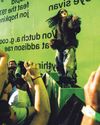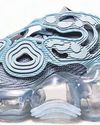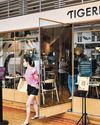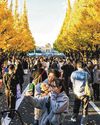
In September 2022, Madam Goh Sock Cheng started seeing things around her in two-dimensional form, or 2D.
When in a crowd of people, for example, she could not perceive depth. And when she walked into a shopping mall or supermarket where the lights were bright, her vision became a mess, she said.
"I forgot what 3D looked like after a while," added the palliative nurse. "It was not the usual way of looking at things any more. It was very confusing and very glaring. Sometimes I would use just one eye to look at an area before I headed there."
Madam Goh, now 62, had thyroid eye disease (TED), a rare autoimmune disease in which the eye muscles and fatty tissue behind the eyes become inflamed, pushing the eyes forward or causing the eyes and eyelids to become red and swollen.
In some individuals, the eyes end up being out of line, leading to double vision. In rare cases, TED can cause blindness from pressure on the nerve in the back of the eye or ulcers that form on the front of the eye.
The incidence rate of TED is approximately 19 out of 100,000 people a year globally. In Singapore, according to the National University Hospital (NUH), TED has a prevalence of 1 per cent to 2 per cent in the population, or an annual incidence of between 30 and 50 cases per 100,000 people.
Despite having the word "thyroid" in its name, about 30 per cent of TED patients do not have any thyroid disease but still developed TED, said Adjunct Associate Professor Gangadhara Sundar, a senior consultant with the Department of Ophthalmology at NUH.
That is one reason why the condition usually gets misdiagnosed as allergic conjunctivitis or dry eyes.
Bu hikaye The Straits Times dergisinin December 29, 2024 sayısından alınmıştır.
Start your 7-day Magzter GOLD free trial to access thousands of curated premium stories, and 9,000+ magazines and newspapers.
Already a subscriber ? Giriş Yap
Bu hikaye The Straits Times dergisinin December 29, 2024 sayısından alınmıştır.
Start your 7-day Magzter GOLD free trial to access thousands of curated premium stories, and 9,000+ magazines and newspapers.
Already a subscriber? Giriş Yap

GRANNY LIFTS THE BAR ON KEEPING FIT
Ms Cheng Chen Chin-mei beamed broadly as she hoisted a 35kg weightlifting bar to her waist, dropped it and waved confidently to the enthusiastic crowd in a competition in Taipei.

Youth rewrite social norms
It has always been the case that young people drive societal change.

Zoo pygmy hippo adored by internet
For users scrolling through TikTok, X and Instagram, one animal has emerged as the undisputed star of 2024: Moo Deng, a baby pygmy hippopotamus at Khao Kheow Open Zoo in Chonburi, Thailand.

Warabimochi gives snack lovers much to chew on
Singapore was mad for mochi in 2024, the craze sparked by the arrival in February of popular Japanese brand Warabimochi Kamakura.

Virtual Travel Tools Take Off
Virtual tools reshaped the travel landscape in 2024, driving innovation and transforming experiences for travellers worldwide.

X factor behind pop princesses' reign
From Charli XCX and Sabrina Carpenter to Chappell Roan and Billie Eilish, women ruled the airwaves in 2024.

Ugly shoes stand out
In an era when fashion trends come and go faster than you can lace up your sneakers, one movement has proved its staying power: ugly shoes.

TikTok's very mindful, very demure influence
You see how TikTok continued to foster the exchange of ideas and philosophy between borders and cultures in 2024? Very mindful, very demure.

Quitting the F&B scene
La Dame de Pic, Tippling Club, Gemma, Art di Daniele Sperindio, Sushi Kimura, Beni, Chef Kang's, Sommer and Braci are all restaurants that fine-dining fans might recommend as must-visit places in Singapore.

Rising mercury shifts seasons
The year 2023 was recorded as the hottest in history, and 2024 is on track to surpass it.